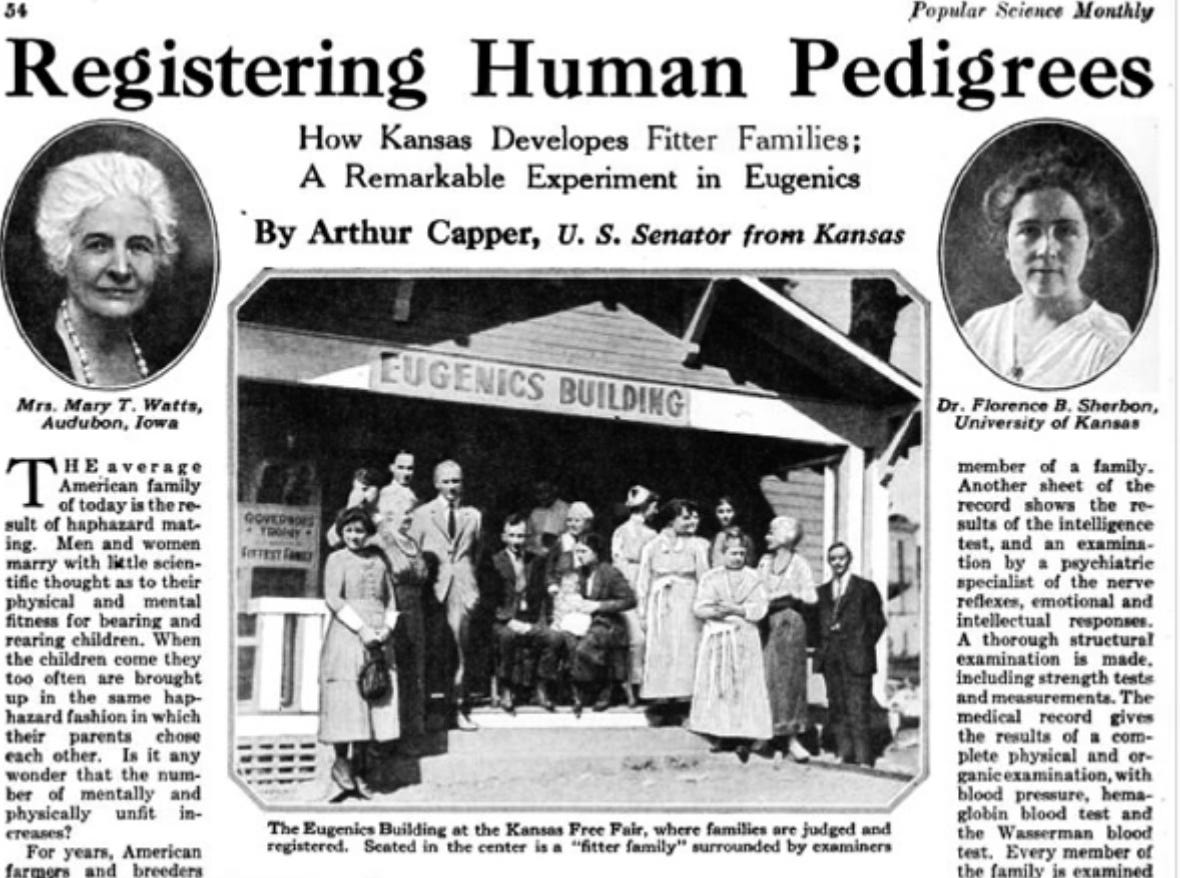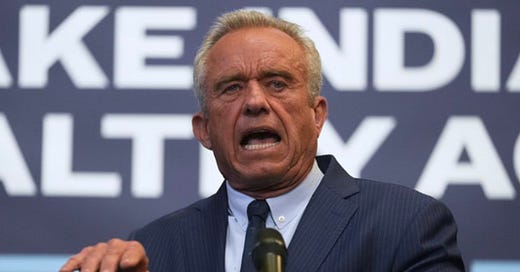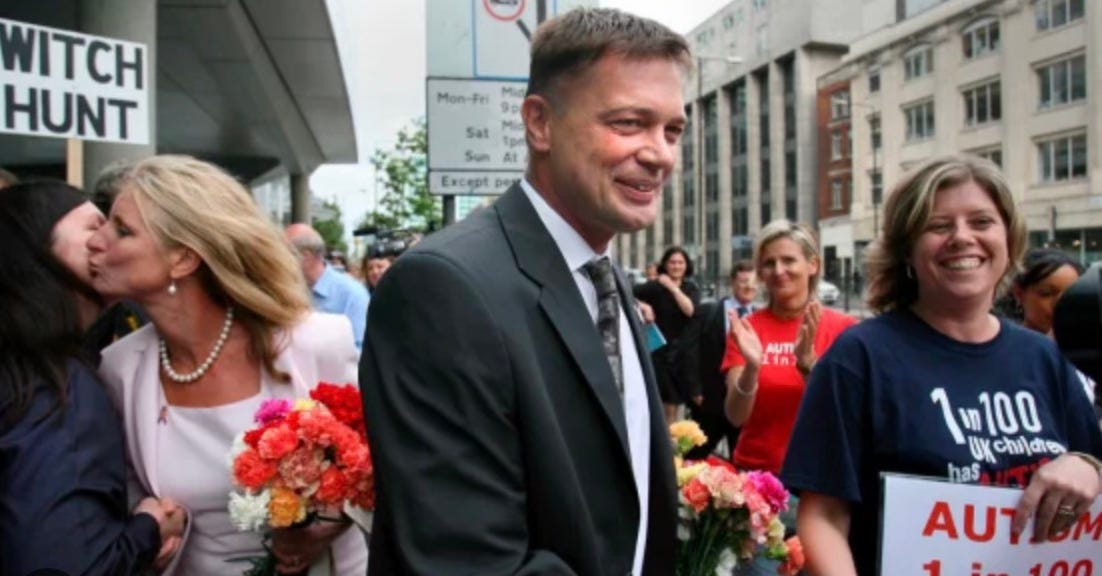Back in December, we wrote that Robert F. Kennedy Jr. had “refashioned himself as the velvet glove of American conspiracism,” a man who draped himself in the Kennedy legacy while pumping out paranoia and poison. At that point, he was still on the campaign trail, leaning into anti-vaxx rhetoric and spiritual nationalism with the manicured confidence of a man who knows his name still buys him unearned legitimacy.
Now, two months into his tenure as Donald Trump’s Secretary of Health and Human Services, Kennedy has made it clear that he is no longer merely dog-whistling to the conspiracy faithful: he’s taking a blowtorch to scientific truth and basic human decency.
His favourite target? Autistic people.
In a recent interview, Kennedy revived one of the most dangerous lies of the last twenty-five years: the thoroughly debunked myth that vaccines cause autism. “We’re seeing something new,” he said, eyes gleaming with that messianic fervour that always accompanies the most committed demagogues. “We didn’t see these kinds of kids when I was young. This is something happening to our children” (Kennedy Jr., 2025.)
“These kinds of kids.” That phrase should stop everyone in their tracks.
Because when Kennedy says, “these kinds of kids,” he doesn’t mean kids like our children, our nieces, our nephews. He doesn’t mean your friend’s son or your colleague’s daughter. He means something else entirely, something he views as broken. A problem. A threat. And that’s the real dog whistle here. This isn’t about health. It’s about hierarchy. It’s about making a case for exclusion, for discrimination, for a darker, more eugenic future. And it should terrify every single one of us.
Wakefield’s Ghost and the Return of the Lie
The myth of the vaccine-autism link began, of course, with Andrew Wakefield - the British doctor struck off the medical register for manipulating data, conducting unethical experiments on children, and faking research in pursuit of fame and fortune. Wakefield’s 1998 paper in The Lancet falsely claimed that the MMR vaccine was linked to autism. It was retracted in 2010, and Wakefield was banned from practicing medicine after the British Medical Journal concluded the paper was “an elaborate fraud” (BMJ, 2011).
But Wakefield didn’t disappear. He fled to the United States and was embraced by the American far right, transforming himself into a martyr of the ‘truth movement.’ His message, that Big Pharma was poisoning kids and covering it up, was catnip for the Trump base, and soon he was mingling with Alex Jones, Tucker Carlson, and a then-rising Robert F. Kennedy Jr.
Let’s not pretend Kennedy doesn’t know the origins of these lies. He’s been repeating them for years. What’s different now is that he has power. He sits at the top of the very institution he once derided. He’s in the room where policy is made. And from that seat, he is choosing, choosing, to stir up the exact same disinformation that has already killed and harmed so many.
It is no longer a fringe movement. It is federal policy.
The Real Agenda: From Disgust to Eugenics
Kennedy’s words drip with disgust. Not sorrow. Not empathy. Not concern. Disgust.
“You walk around a mall and you don’t see people my age - 66 years old - who are wearing helmets or diapers or who are nonverbal, non-toilet-trained, and head-banging. This is a new phenomenon.” (Kennedy Jr., 2025)
What he’s really doing here is painting a grotesque caricature, deliberately invoking images that provoke fear, revulsion, and othering. This is the language of propaganda. It’s the same strategy used to marginalise people with disabilities throughout history: frame them as burdens, paint them as unnatural, and then offer a ‘solution.’
And if Trump’s obsession with genetics, the so-called ‘racehorse theory,’ is any indication, that ‘solution’ may be terrifyingly close to full-blown eugenics (LA Times, 2024).
Let’s connect the dots. Trump believes that intelligence, talent, and worth are inherited like bloodstock traits. He has repeatedly suggested that certain families are genetically superior. He praises his own “good genes” and implies that others, by extension, do not have them. Now, with Kennedy installed as the face of American health policy, the ground is being laid for a worldview in which disability and neurodiversity are not accommodated, but eradicated.
This is the real meaning of Kennedy’s crusade: not compassion, but contempt. Not inclusion, but exclusion. Not public health, but a slow, stealthy march toward a society where only the strong, the neurotypical, and the genetically favoured are allowed to thrive.
What Autism Is, And What It Isn’t
Autism is not a disease. It is not an epidemic. And it is not caused by vaccines.
Autism, more accurately termed Autism Spectrum Condition, is a form of neurodiversity. That is, it is a variation in human brain development. Some autistic people are non-speaking; others are highly verbal. Some prefer structure and repetition; others are highly spontaneous. Some need lifelong support, while others live independently. There is no one-size-fits-all.
The term ‘neurodiversity’ was first coined by Australian sociologist Judy Singer in the late 1990s. It reframes neurological differences like autism, ADHD, and dyslexia not as pathologies, but as part of the diversity of human minds (Silberman, 2015).
This approach has been embraced by autistic advocates and backed by a growing body of research. In the UK, the National Autistic Society pushes back on deficit-based models. In the US, the Autistic Self Advocacy Network goes further, demanding that autistic people be recognised as full participants in society, and not as problems to be solved.
But that’s not what Kennedy wants. His words, “head-banging,” “diapers,” “nonverbal,” are spoken to provoke disgust. He is not asking for support or understanding. Instead, he is asking: how do we stop this from happening?
That isn’t science; it’s a narrative shaped by fear, not fact. And it echoes a much older way of thinking, one that pathologised difference and regarded people as deficient in the name of progress.
A Shameful American Legacy

In the early 20th century, the United States was a global leader in the eugenics movement. Between 1907 and 1979, more than 60,000 people were forcibly sterilised under state laws aimed at eliminating the “unfit.” These laws disproportionately targeted disabled people, people of colour, immigrants, and the poor (Lombardo, 2008).
In 1927, the Supreme Court upheld these policies in Buck v. Bell, with Justice Oliver Wendell Holmes declaring: “Three generations of imbeciles are enough.”
The Nazis studied American eugenics closely. Hitler reportedly admired U.S. sterilisation laws, using them as a model for Germany’s own racial purity programme.
Though the post-war years brought a decline in open eugenic rhetoric, the ideology never fully vanished. It simply rebranded, first as genetic counselling, then as “public health.” And now, it re-emerges in the polished language of “risk,” “prevention,” and “concern for the children.”
RFK Jr. is not offering public health. He is offering a dangerous moral panic, one that pathologises entire populations and treats difference as decay.
Neurodiversity as Resistance
Thankfully, there is another movement rising.
The neurodiversity movement is a global coalition of autistic, ADHD, dyslexic, and otherwise neurodivergent individuals demanding dignity and autonomy. It is the antithesis of Kennedy’s vision. It insists that support matters more than conformity. That difference does not mean inferiority. That no person is expendable.
Key texts like The Reason I Jump by Naoki Higashida, Loud Hands: Autistic People, Speaking, and Divergent Mind by Jenara Nerenberg offer nuanced, personal accounts of neurodivergent life. These voices are challenging the mainstream, confronting medical models, and reshaping education, employment, and healthcare policy on both sides of the Atlantic.
In the UK, charities like Autistica, Ambitious About Autism, and the National Autistic Society continue to push for awareness, accommodations, and policy change.
This is the future worth fighting for, not RFK Jr.’s backward-looking dystopia.
Conclusion: We See What You’re Doing
We said it before, and we’ll say it again: Robert F. Kennedy Jr. is not an outsider. He is not a brave dissenter. He is not a misunderstood truth-teller. He is a propagandist, a zealot, and now, a policymaker with the power to turn his ideology into law.
There is no mystery about what he’s doing. We see it. And we must keep saying it: loudly, repeatedly, and without apology, because history doesn’t just repeat. Sometimes it reinvents itself in a nicer suit and a familiar name. But the ending, if we let it, will be just as dark.
Support Neurodivergent Communities
Plague Island readers, this is not just an American problem. The rhetoric is global, and the consequences are real. Don’t let these lies go unchallenged. When you hear misinformation, whether online, in conversation, or from a figure of authority, call it out. The truth matters, and so does your voice.
Please also lend your support to neurodivergent-led organisations:
UK
USA
We all have a role to play in pushing back. Silence allows falsehoods to take root; the truth needs allies. We do not have to accept this, and we do not have to repeat the past.
Notes From Plague Island is quickly becoming a full-time venture. We want to grow our output and dedicate more time to writing, but it takes support! If you enjoy our work and can help, please support us on ‘Buy Me a Coffee.’ Every coffee helps, in many ways. Thank-you - we appreciate you!
https://buymeacoffee.com/notesfromplagueisland
References
Autistica: The UK’s autism research charity. Available at: https://www.autistica.org.uk [Accessed 17 April 2025]
Ambitious About Autism. Available at: https://www.ambitiousaboutautism.org.uk [Accessed 17 April 2025]
Autistic Self Advocacy Network. Available at: https://autisticadvocacy.org [Accessed 17 April 2025]
BBC News. (2025) ‘RFK Jr confirmed as Trump’s Health Secretary.’ Available at: https://www.bbc.co.uk/news/articles/c626eezr76wo [Accessed 17 April 2025]
British Medical Journal. (2011) ‘Wakefield’s article linking MMR vaccine and autism was fraudulent.’ BMJ, 342, c7452. Available at: https://www.bmj.com/content/342/bmj.c7452 [Accessed 17 April 2025]
The Independent. (2025) ‘Robert F. Kennedy Jr questions rise in autism: “Where are the adults in diapers?”’ The Independent, 16 Apr. 2025. Available at: https://www.independent.co.uk/news/world/americas/us-politics/autism-cdc-robert-f-kennedy-jr-b2734181.html [Accessed 17 April 2025]
Lombardo, P.A. (2008) Three Generations, No Imbeciles: Eugenics, the Supreme Court, and Buck v. Bell. Ann Arbor: University of Michigan Press.
Los Angeles Times. (2024) ‘Opinion: Trump’s obsession with genetics and the rise of modern eugenics.’ Los Angeles Times, 10 Oct. 2024. Available at: https://www.latimes.com/opinion/story/2024-10-10/genes-donald-trump-hugh-hewitt-adolph-hitler-eugenics [Accessed 17 April 2025]
National Autistic Society. ‘What is Autism?’ Available at: https://www.autism.org.uk [Accessed 17 April 2025]
NeuroClastic: The Autistic People’s Voice. Available at: https://neuroclastic.com [Accessed 17 April 2025]
Science-Based Medicine. (2022) ‘Robert F. Kennedy Jr.’s “The Real Anthony Fauci” is a conspiracy theory fever dream.’ Available at: https://sciencebasedmedicine.org/rfk-jr-and-the-real-anthony-fauci/ [Accessed 17 April 2025]
Silberman, S. (2015) NeuroTribes: The Legacy of Autism and the Future of Neurodiversity. New York: Avery Publishing.
Singer, J. (1998) Odd People In: The Birth of Community Amongst People on the “Autistic Spectrum”. Honours Thesis. University of Technology Sydney. [Unpublished]
The Arc. ‘For People with Intellectual and Developmental Disabilities.’ Available at: https://thearc.org [Accessed 17 April 2025]





